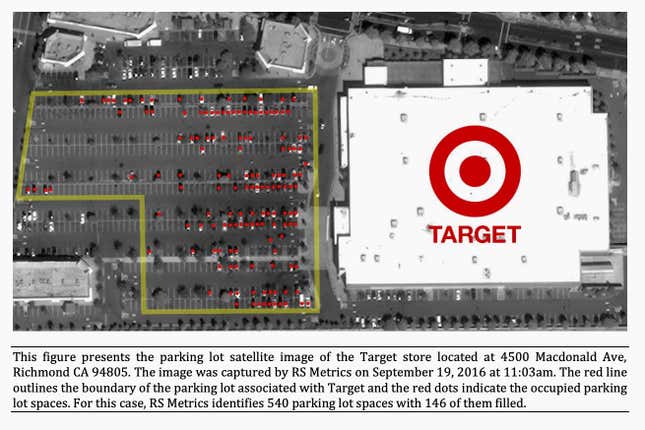Investors who can afford to hire satellites to scan parking lots are finding a significant edge in the stock market.
Satellite speculators have reportedly used techniques like car-counting, tracking oil inventories or watching corn fields to make profitable forecasts of equity and commodity markets. Now, research from finance professors at UC Berkeley and the University of Kentucky provides the first independent evidence that these trading strategies work—and that they’re likely being used to the detriment of small-time investors.
The space datasets in question, created by firms RS Metrics and Orbital Insight, allow sophisticated investors to gain near-realtime understanding of same-store sales growth, an important metric for understanding the business of physical retailers like Walmart, Target or Costco. Investors can then make bets on or against companies just before they disclose quarterly financial results.

A trading strategy based on this data would be able to generate significant gains, according the working paper. The researchers used satellite data—4.9 million daily observations covering 75,992 unique stores from 44 major US retailers between 2011 and 2017—to separate publicly-traded retailers into those with higher and lower sales growth. Per the study, an investor with access to that data who sold the top under-performing stocks short and purchased the top high-performing stocks ahead of quarterly reports could see returns of 4.95% over just a few days, after the cost of trading.
These returns are only available for investors who are willing to pay a “substantial fee” for the satellite data and have (like these academics) the know-how to correlate that information with other data sets on same-store sales. The researchers found that financial analysts who provide consensus forecasts of stock performance were likely not using the satellite data. That helps explain another finding: There is a measurable increase in the short-selling of retailers whose parking lot data look bad in the days before earnings reports, taking advantage of the divergence between public expectations and actual store performance.
In other words, investors are using a strategy like the one the authors describe. Drilling down, the authors even estimate that the main buyers of retailer stocks ahead of bad earnings reports are individual investors.
This raises troubling questions for the lead author, Berkeley professor Panos Patatoukas, about efficient markets and information. Generally, economists expect that information incorporated into public markets will result in more accurate prices. But satellite data on store performance has been around for eight years, and an arbitrage opportunity clearly still exists in the market. The growth of big-data analytics means important data—like the geographic statistics being collected by your mobile phone and millions of others—will likely be inaccessible to most investors, which might require regulators to re-think what material information all investors deserve.
Still, this specific advantage isn’t likely to last for long, thanks to this paper, and an industry full of newcomers trying to drive down the price of access to space data. Planet, a satellite startup, is collecting imagery like this view of what is said to be the largest Walmart in the US, located in Albany, New York:
And that’s just the beginning when it comes to the usability of satellite imagery. Planet and other new satellite companies are working to deploy higher-resolution cameras and radar sensors that can see through clouds to gather even more detail about what’s happening on Earth.
Some of the results will be unambiguously good—fewer missing airliners and secret missile programs. One other thing is certain: Motivated quants on Wall Street are only just beginning to leverage the market-moving information that can be gathered in orbit.
